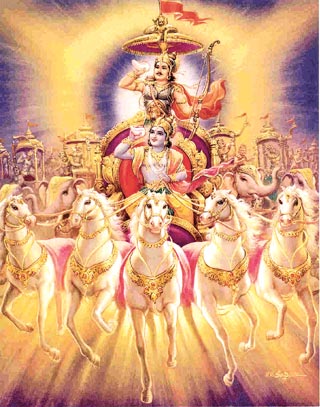Gita: The Mantra to Freedom
 “…if you are killed (in the battle) you will ascend to heaven. On
the contrary if you win the war you will enjoy the comforts of earthly
kingdom. Therefore, get up and fight with determination… With equanimity
towards happiness and sorrow, gain and loss, victory and defeat, fight.
This way you will not incur any sin.” (Bhagavad Gita) “…if you are killed (in the battle) you will ascend to heaven. On
the contrary if you win the war you will enjoy the comforts of earthly
kingdom. Therefore, get up and fight with determination… With equanimity
towards happiness and sorrow, gain and loss, victory and defeat, fight.
This way you will not incur any sin.” (Bhagavad Gita)
We have had enough discussions over war, peace and heroes in last
couple of months. Some heroes are made out of war and some are made out
of peace.
With the world precariously poised between war and peace, the
question is often raised in India, whether the Bhagavad Gita advocates
war or peace.
The content of Gita is the conversation between Krishna and Arjuna
taking place on the battlefield before the start of the Kurukshetra war.
Responding to Arjuna’s confusion and moral dilemma about fighting his
own cousins, Krishna explains to Arjuna his duties as a warrior and
prince and elaborates on different yogic and Vedantic philosophies, with
examples and analogies.
Most religions of the world believe that war is undesirable and
avoidable because it involves killing fellow humans. But there can be
situations when waging war is a better path than tolerating evil. It
does not mean that any religion glorifies war.
|

Krishna and Arjuna during the battle |
Bhagavad Gita which Hindus consider sacrosanct contains the backdrop
of a battlefield and a warrior protagonist. That leads many people to
believe that Hinduism supports the act of war.
When Arjuna realises that many of his kinsmen and old friends are
among the ranks of the enemy, he is appalled by the fact that he is
about to kill those he loves. He is unable to stand there any longer,
refuses to fight and says that he does not “desire any subsequent
victory, kingdom, or happiness”. Arjuna questions, “How could we be
happy by killing our own kinsmen?”
Krishna in order to persuade him to fight, reminds him that there is
no such act as killing. He further claims that soul as only reality and
body is simply an appearance. And for Arjuna, a member of Kshatritya or
the warrior caste, fighting the battle is righteous. Krishna advises him
that Arjuna should wage the war because it was a part of his duty and
that he should not think of withdrawing from his responsibility out of
fear or cowardice.
Millions of Hindus, and an increasing number of non-Hindus, use the
Bhagavad Gita as a spiritual guide within their own lives, reading or
hearing it regularly and bringing it to bear on their own situations by
commenting on it to themselves.
During my first visit to India, I heard of a Brahmin who has never
spoken a word to the people who come to seek advice from him but showed
a verse from Bhagavad Gita. That particular line has always helped
people to get rid from their troubling situation.
The Bhagavad Gita was of particular use to Hindu intellectuals and
public figures as Indian nationalist ideas began to emerge under British
rule from the late eighteenth century onwards.
As the Indian nationalist movement grew, the Bhagavad Gita was
interpreted in radically different ways by Hindu politicians. Bal
Gangadhar Tilak (1856-1920), wrote a commentary on it whilst imprisoned
by the British. He stressed its rejection of quietism and its
justification of violent actions against tyrants, and used it to
encourage revolutionary activity.
Mahatma Gandhi, on the other hand, read the text daily and saw the
Mahabharata war as an allegorical representation of the internal
struggle between the human soul and worldly temptations. For him there
was nothing on the text which contradicted his principles of
non-violence and his politics of passive resistance. On the contrary, he
saw his principles and politics as derived from the text.
No work in all Indian literature is more quoted, because none is
better loved, in the West, than the Bhagavad-Gita. Translation of such a
work demands not only knowledge of Sanskrit, but an inward sympathy with
the theme and a verbal artistry. |



